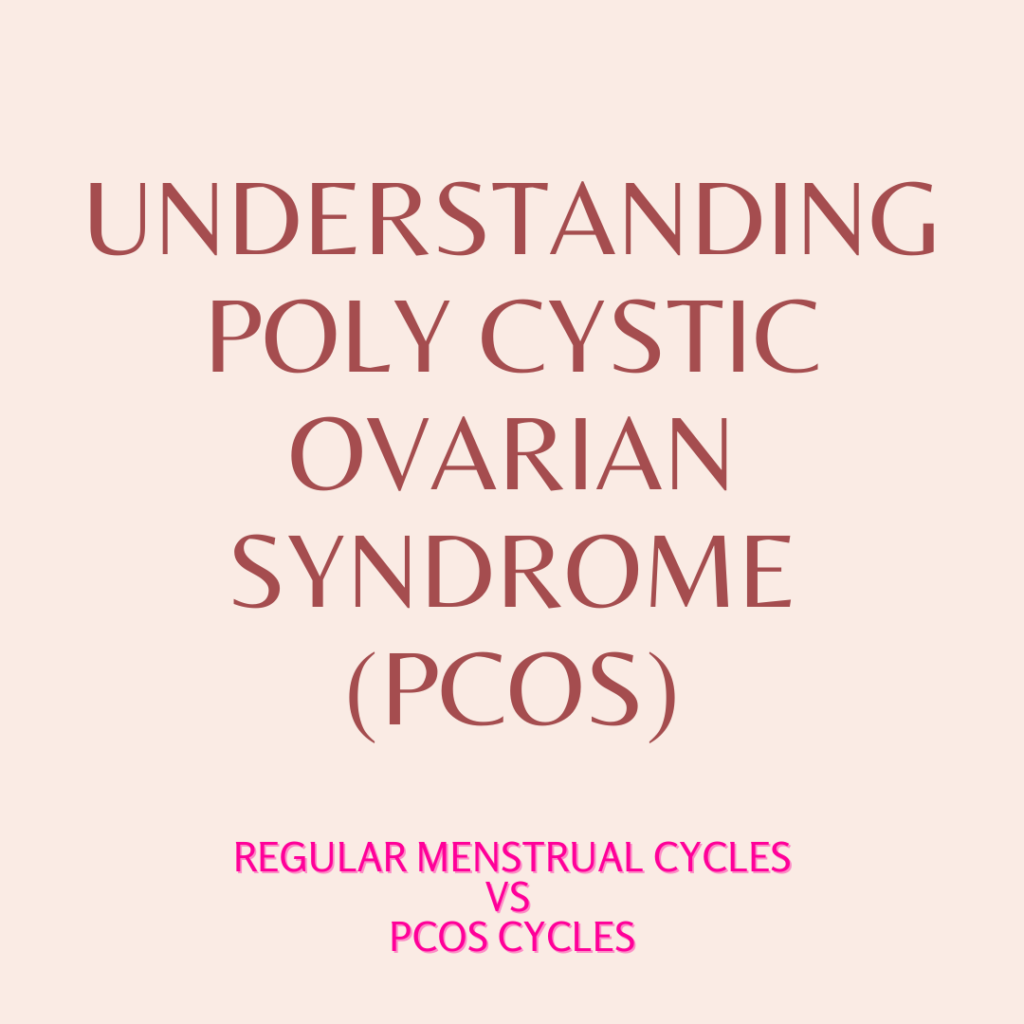
Understanding a regular healthy menstrual cycle
In a regular menstrual cycle, the ovaries are signalled by a series of hormonal pathways, for the ripening of a group of follicles, each containing an immature egg.
3-4 days before ovulation, ONE of the ripening follicles is chosen to reach FULL MATURITY and OVULATE.
The other follicles which have not been chosen become diminished.
The CHOSEN follicle continues to grow with the egg within it.
By ovulation, the follicle bursts and the egg is released.
The fallopian tube then works in synchronicity to draw the released egg in and along the tube to the uterus.
But what happens to the menstrual cycle, when someone has PCOS?
In PCOS, there is a formed group of follicles.
But there is NO dominant follicle that gets chosen to reach FULL maturity.
Ovulation does not take place.
Because there is not ONE chosen follicle, there is no diminishing of the other follicles.
So these follicles become undeveloped follicles.
These underdeveloped follicles form tiny cysts.
And these cysts sit on the ovaries.
This leads to polycystic ovaries – which can be seen on an ultrasound.
Women with PCOS, can get infrequent periods of more than 35 days, and some getting their periods only a couple of times in the year.
But Skipped Periods do not always mean PCOS
Many women who do not get a regular period, often think that they have PCOS after googling their symptoms.
There are many reasons why you might be skipping periods, which may not be PCOS related.
Skipping three or more consecutive periods should flag your attention, if it has not already.
Skipping periods (if you are not pregnant, breastfeeding or peri-menopausal) often is a result of hypothalamic amenorrhea.
It can show up as :
- A pattern of Menstrual cycles < 26 days or > 34 days
- 8 days periods or longer
- Skipped periods
- Heavy periods
- Low or no midcycle fertile cervical mucus
- BBT does not indicate any ovulatory rise
- Sleep problems because of low progesterone levels
- Feeling depressed
- Difficulty in conceiving
- SYMPTOMS OF PCOS
So then, how is PCOS diagnosed?
2 out of 3 of the following, often leads to a PCOS diagnosis:
- Symptoms of excess androgens: acne, hair loss, hair in unwanted places such as upper lip, chin, chest or belly, nipple
- Polycystic ovaries SEEN on ultrasound
- infrequent periods more than 35 days
Many women with PCOS also experience other symptoms that suggest PCOS:
- Anxiety
- Depression
- Weight gain
- Struggling to lose weight
- Skin tags
- Trouble getting pregnant
- Have to rely on the pill to treat symptoms like acne and irregular cycles
- Darkened, velvety-textured skin around the neck, in armpits or in groin
- Skipped periods, sometimes for months at a time
- Binge eating
Understanding Hypothalamic amenorrhea…
Hypothalamic amenorrhea can happen to women when they are under a high amount of stress and your body decides that it is not time for reproduction to preserve your energy for your overall well-being.
Because, you do not have any spare energy to spare, you stop ovulating and hence you do not have a period.
This can happen to teens as well as women in their 20’s and 30’s.
Who can experience this?
- You are under a high level of life stress
- Overexercising – often common amongst runners
- Being underweight
- A combination of the above.
- High-intensity athlete (High intensity workouts, distance running for more than 5 days in a week)
- You workout a lot
- Eat a restrictive diet (remember that you need good fats to make your hormones)
- Are below optimal body weight for your height
Holistic Approach to PCOS
Whether you are newly diagnosed to PCOS or have been struggling with PCOS symptoms, it is recommended to address PCOS and your overall well-being through lifestyle changes.
You can do so by:
- Balancing your blood sugar levels
- Decreasing the inflammation in your body
- Decreasing stress that you are experiencing
- Supporting your adrenal glands
- Decreasing your exposure to hormones disruptors in your environment
- Supporting your liver’s detoxification.
The way forward with PCOS support
I have created a succinct PCOS guide for a holistic approach to PCOS. You can grab it here.
In addition to lifestyle changes, you can do womb steaming to help regulate your menstrual cycles. You can book your virtual womb steaming session by clicking here.
I hope that you have found this article helpful.
You can leave your feedback and questions in the comments section.
Carpe Diem
Anusooya
